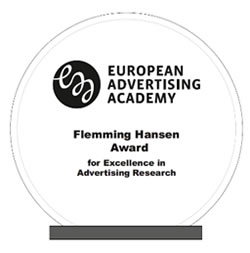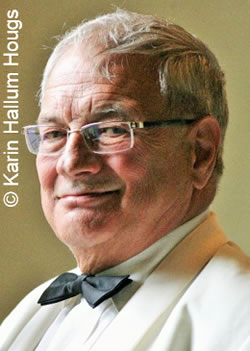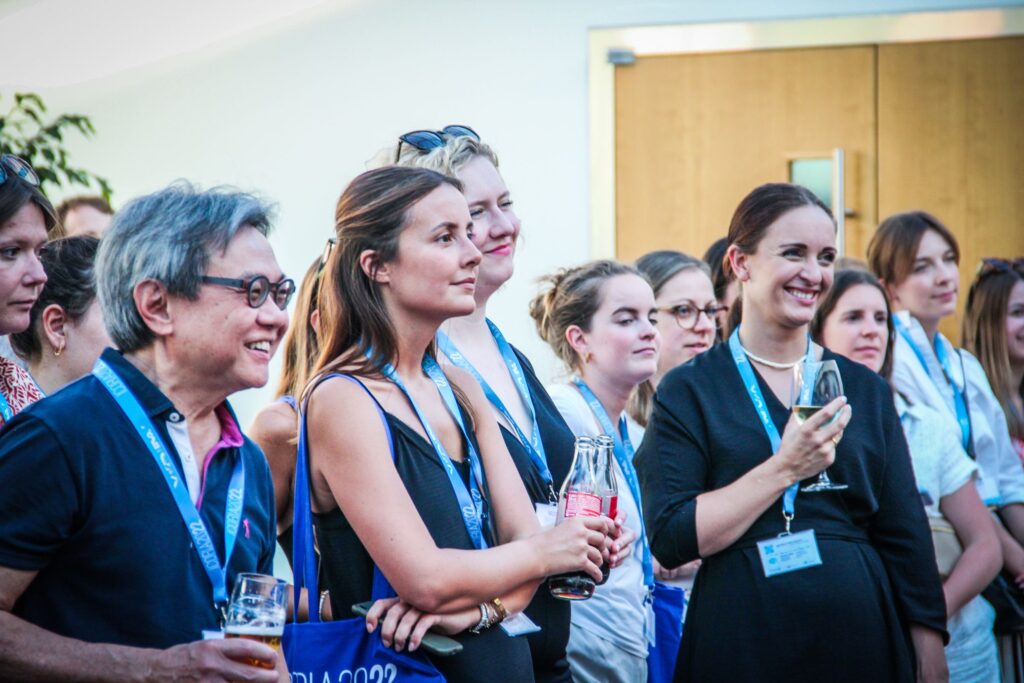Awards & Grants
- EAA Research Grant
- ICORIA Student Grant
- The Flemming Hansen Award
- ICORIA best paper awards
EAA Research Grant
To support researchers to conduct innovative, excellent research into advertising, the European Advertising Academy provides a yearly EAA Research Grant.
The EAA can award a total of € 3,000 each year. Applicants can apply for a maximum of €1,500. This means that the EAA can award at least two research grants each year. If multiple researchers request a smaller amount, more than two grants may be awarded.
Grant criteria
The following conditions must be met for the proposals:
- The lead applicant of the project must be EAA or EAA / AAA joint member.
- All EAA of EAA/AAA joint members are eligible to apply as leading or as co-applicant for one grant each year.
- The funding (up to € 1,500) must be used for research-related expenses.
- The project needs to be executed (and the funding spent) within one year after the grant decision has been made.
- Recipients are expected to acknowledge the EAA Research Grant in any publication resulting from the research that was (partly) funded by the grant.
- The lead applicant of a successful application cannot apply for the following three years as lead applicant.
Application
Each application should include:
- A short description of the proposed study including the problem statement and relevance of the study.
- A brief overview of research design and methods.
- A brief discussion about the fit with EAA / ICORIA.
- An outline of the budget required with specification of costs.
- A project timeline.
- Details about the project team.
The total application length is 2 pages, font 12. You may use the space as you see fit, as long as the information requested above is included.
Applications should be submitted via email to info@icoria.org no later than the conference paper submission deadline (March 15, 2024). The EAA Research Grants will be awarded during ICORIA.
Selection
The grant decision will be made by a jury of members of the EAA board. The jury selects up to three applicants based on the following evaluation criteria:
- Research quality and relevance
- Feasibility of the project
- Fit with EAA / ICORIA
Check out the list of previous winners of the EAA Research Grant.
ICORIA Student Grant
To encourage young researchers who provide high-quality advertising research, but have limited resources to attend the yearly ICORIA meeting, the European Advertising Academy will provide a yearly ICORIA student grant by waiving the conference fee for up to five selected researchers.
Grant criteria
Any researcher, who submitted an original research paper to the yearly ICORIA meeting and plans to present the paper if accepted, is eligible. Applicants who received an ICORIA Grant in previous years will not be funded again and should not apply. Applicants must agree to attend the conference to receive the grant and present the paper cited in the application proposal and accepted for presentation. Recipients are expected to acknowledge the ICORIA Grant if required by a publication outlet.
Application
Each application should include:
- A “Statement of Purpose” (max 1 page) that makes the case for the applicant’s need of the research grant. The statement should highlight the applicant’s economic situation as a researcher and explain why the applicant requires additional funding to attend ICORIA. The statement needs to indicate the title of the paper that has been submitted to ICORIA.
- A current CV.
Applications should be submitted via email to info@icoria.org once the applicant has submitted a research paper to ICORIA, but no later than the conference paper submission deadline (March 15, 2024). Award recipients will be notified in May at the time the decision about the conference paper is out.
Selection
The grant decision will be made by a jury of members of the EAA board. The jury selects up to five applicants based on two evaluation criteria and will consider diversity as a principle:
- research quality (i.e., reviewer scores received for the research paper submitted to ICORIA) and
- applicant’s need (i.e., arguments outlined in the application letter).
Check out the list of previous winners of the ICORIA Grant.
The Flemming Hansen Award

Since 2015, the European Advertising Academy (EAA) assigns the Flemming Hansen Award every second year. This long-term impact award honors a scholar who has made contributions to distinguished scholarship in advertising research. Specifically, the EAA will recognize an author of one or more publications that had a significant impact in the field of advertising. The recipient is invited to the International Conference on Research in Advertising (ICORIA) and will receive the award at the gala dinner of the conference.
The EAA will consider self-nomination as well as nomination by another person or organization. All nominees will be considered against the same criteria. The Selection Committee consists of four members which are chosen by the current President of the EAA. She or he selects one jury president and three additional jurors which are past presidents or current members of the EAA. None of the current jury members is nominated him- or herself.
For suggesting a suitable candidate for nomination, one has to submit a nomination letter that includes the candidate’s CV which should describe significant contributions to distinguished scholarship made by the nominee (maximum one page). Nominations for the award must usually be sent by April 1st of the respective award year (odd years) to the EAA Award Manager.
About Flemming Hansen

Flemming Hansen was a marketing research and marketing communication scholar from Denmark who was very successful and influential in both, business and academia. He was a prolific professor at the Copenhagen Business School. In 2002, Flemming Hansen initiated ICORIA with a first and at that time small conference in Copenhagen. He was also one of the founders of the EAA in 2005 and he was the first President of the EAA. He passed away in 2010. In 2014, the EAA decided to name its award after Flemming Hansen.
Flemming Hansen Award Winners
- 2023: Douglas West
- 2021: Patrick De Pelsmacker
- 2019: Peter Neijens
- 2017: Ray Taylor
- 2015: John Rossiter
ICORIA best paper awards
Thessaloniki 2024
Best conference paper: Scott Koslow, Huw O’Connor, Mark Kilgour & Sheila Sasser: “The creativity conundrum of advertising development: Solving a knowledge resources paradox by activating dynamic capabilities”
Best student paper: Stefan Rohrbach, Daniel Bruns & Tobias Langer: “The carousel effect: Levering sideways swiping for enhanced ad effectiveness in social media”
Bordeaux 2023
Best conference paper: Mag Karpinska-Krakowiak and Martin Eisend: “Realistic portrayals of untrue information: The effects of deepfaked ads and different types of disclosures”
Best student paper: Lotte Hallez, Bram Spruyt, Filip Boen and Tim Smits: “Packed and claimed for sustainability: A multi experiment test of how consumers perceive soft drink packaging sustainability”
Prague 2022
Best conference paper: Steven Holiday, Jameson L. Hayes, Haseon Park, Yuanwei Lyu and Yang Zhou: “Consumer-brand engagement and social media influencers: A discrete emotion perspective on influencer marketing strategy using facial expression and linguistic analysis”
Best student paper: Manoela Costa Policarpo, Vanessa Apaolaza, Patrick Hartmann, Mario R. Paredes, Clare D’Souza and Aitor Marcos: “The effect of social cynicism on consumer trust in sustainable fashion clothing brands: The role of perceived greenwashing and conspicuous consumption motives”
Bordeaux 2021 (online)
Best conference paper: Petar Gidaković, Vesna Zabkar, Maja Arslanagić-Kalajdžić, Mateja Drnovšek and Mojca Svetek: “Consumer engagement: aligning the construct’s conceptualization and operationalization”
Best student paper: Melanie Hirsch, Alice Binder and Jörg Matthes: “The influence of issue fit and political fit of targeted political advertising on party evaluation and chilling effects”
Krems 2019
Best conference paper: Camille Singh and Lawrence Ang: “The influential effects of Facebook envy on purchase intent”
Best student paper: Freya De Keyzer, Nathalie Dens and Patrick De Pelsmacker: “Which Personalization Elements Cause Consumers to Perceive Ads on Facebook as More Personalized? A Conjoint Analysis”
Valencia 2018
Best conference paper: Seounmi Youn and Wonsun Shin: “The effect of Facebook newsfeed ads on teens’ information disclosure: The interplay of persuasion knowledge, benefit-risk assessment, and ad skepticism”
Best student paper: Steffi De Jans, Liselot Hudders and Veroline Cauberghe: “How an advertising disclosure alerts teenagers to sponsored vlogs: The moderating role of influencer transparency”
Ghent 2017
Best conference paper: Jiska Eelen, Peren Ozturan, and Peeter Verlegh: “The differential impact of brand loyalty on traditional and online word of mouth”
Best student paper: Caroline De Bondt, Anneleen Van Kerckhove, and Maggie Geuens: “’Look at that body!’ How anthropomorphic packaging shapes systematically appeal to consumers”
Ljubljana 2016
Best conference paper: Stefan F. Bernritter, Somaiya Tabib, and Sophie C. Boerman: “How modality and explicitness of disclosures of sponsored branded online video content affect consumers’ online brand engagement”
Best student paper: Yana Avramova, Patrick De Pelsmacker, and Nathalie Dens: “Brand placement in text: The short- and long-term effects of placement modality and need for cognition”
London 2015
Best conference paper: Morris Kalliny, Salma Ghanem, Brett Boyle, Matthew Shaner, and Barbara Mueller: “How religious symbols in commercial messages resonate with consumers: A cross-cultural analysis”
Best student paper: Verena Wottrich, Peeter Verlegh, and Edith Smit: “How game customization and brand trust affect persuasion in advergames – the role of consumer privacy concerns”
Amsterdam 2014
Best conference paper: Jiska Eelen and Roxana Seiler: “Creative media use increases online sharing of your ad (but it doesn’t do much for your brand”
Best conference paper: Maja Arslanagić-Kalajdžić and Vesna Žabkar: “Understanding agency-client relationships better through clients’ perceptions of value and value antecedents”
Best student paper: Stefan F. Bernritter, Peeter W. J. Verlegh, and Edith G. Smit: “Why nonprofits are more liked: The effect of brand symbolism and warmth on consumers’ intention to like brand pages on Facebook”
Zagreb 2013
Best student paper: Sophie Boerman, Eva van Reijmersdal, and Peter Neijens: “How does the type of sponsorship disclosure affect viewers’ attention and persuasion knowledge? Insights from an eye tracking study”
Stockholm 2012
Best conference paper: Cristel Antonia Russell and Valeria Noguti: “Perceptions of the influence of television series on others affect the impact of alcohol product placements on young audiences”
Best student paper: Hanna Berg and Magnus Söderlund: ”Face value: Headless model images increases consumer identification with product target groups”
Berlin 2011
Best conference paper: Franziska Küster and Martin Eisend: “Time heals all wounds-Explaining immediate and delayed effects of message sidedness”
Best student paper: Katarina Panic, Verolien Cauberghe, and Patrick De Pelsmacker: “Promoting dental hygiene to children: Traditional and interactive media following threat appeals”
Madrid 2010
Best conference paper: Martin Waiguny and Ralf Terlutter: “Commercial or not? Differences in the perception of TV advertisments and advergames by children”
Best student paper (2 winners):
Martine Lewi and Patrick De Pelsmacker: “Affect is an important factor in processing alzheimer disease awareness messages”
Lotte Willemsen, Fred Bronner, and Peter Neijens: “The perceived usefulness of online consumer reviews”
Klagenfurt 2009
Best conference paper: Edward C Malthouse and Bobby J Calder: “Media placement versus advertising execution”
